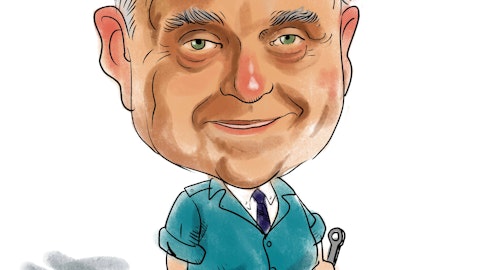Chesapeake Energy Corporation (NYSE:CHK)‘s Aubrey McClendon is no longer the company’s CEO. He left on April 1 and it was no April Fools’ joke.
Now the inevitable question: Who will replace the man who founded and led Chesapeake Energy Corporation (NYSE:CHK) through both the good times and bad?

Chesapeake’s temporary chief
In a statement released on Friday, Chesapeake Energy Corporation (NYSE:CHK) said that Steve Dixon, the company’s chief operating officer, will serve as acting CEO until a permanent replacement is selected.
Dixon, who joined Chesapeake Energy Corporation (NYSE:CHK) back in 1991, has held various senior positions at the company. His tenure culminated with his appointment as executive vice president and chief operating officer – positions he has served since 2006.
Chesapeake Energy Corporation (NYSE:CHK)’s board has also established a three-man “office of the chairman,” which includes Dixon, as well as Archie Dunham, who currently serves as non-executive chairman of the board, and Domenic Dell’Osso, the company’s chief financial officer.
The members of this three-person team have been intimately involved in planning the CEO transition process, as highlighted in Chesapeake Energy Corporation (NYSE:CHK)’s succession plan. They are “working closely to transition oversight of strategic, operational, and financial matters as well as certain day-to-day management responsibilities” from McClendon to whoever replaces him.
Could shares pop with announcement of new CEO?
The appointment of a new CEO is a huge deal for Chesapeake. One of the major reasons the company’s shares were so depressed last year was because of investors’ mistrust of McClendon – a stigma traders affectionately termed the “Aubrey discount.”
Since the company announced in late January that McClendon would be departing as CEO, shares are up a little over 7%. The next catalyst to drive them higher will almost certainly be the appointment of a capable and experienced CEO whose management style should be – ironically – a world apart from McClendon’s, at least when it comes to taking risks.
Though McClendon helped Chesapeake accumulate several choice oil and gas properties, he also oversaw the company’s detour into an abyss of debt – liabilities that threaten its future even to this day. If the new CEO is one with a proven track record of fiscal discipline – and can convince the markets that he or she will help turn the company’s worrying debt situation around – then shares are likely to pop.
If, on the other hand, the new CEO turns out to be a close pal of McClendon’s, or leads investors to believe that nothing fundamental has changed about Chesapeake’s management style, then shares are likely to decline.

